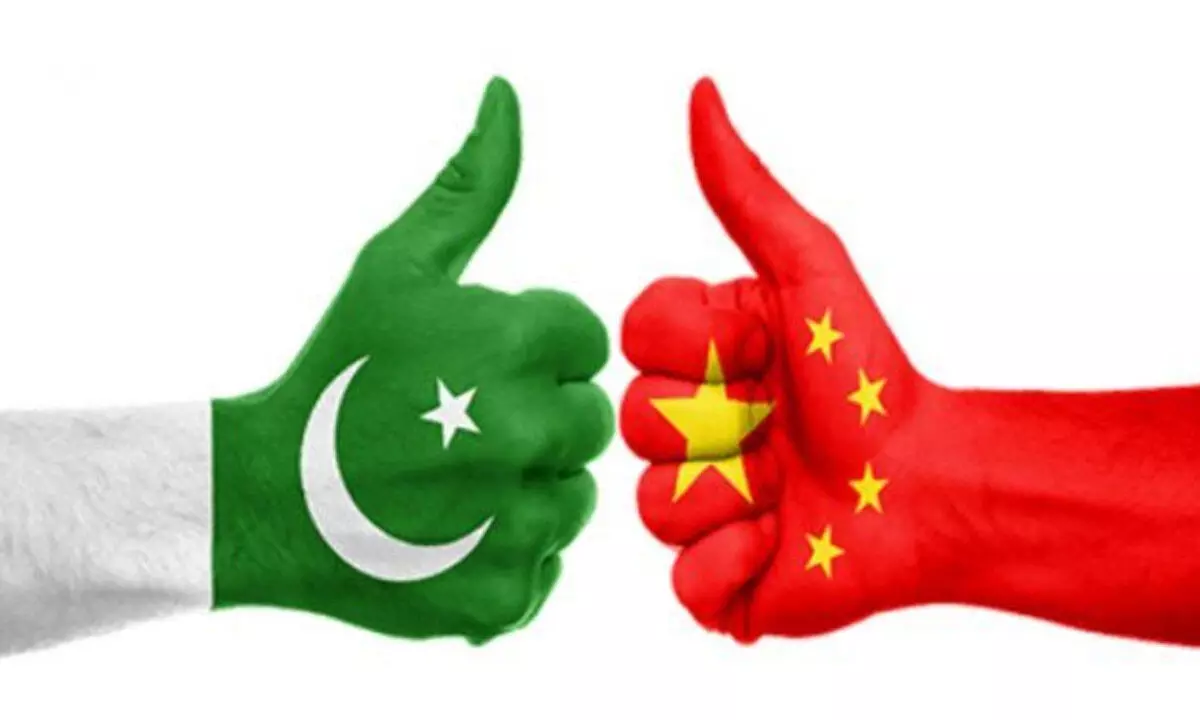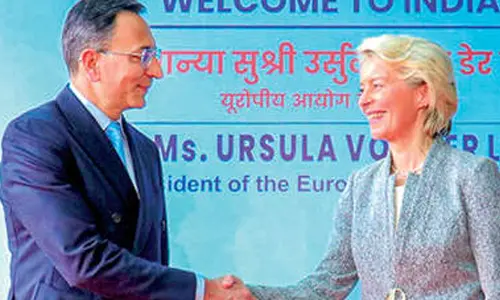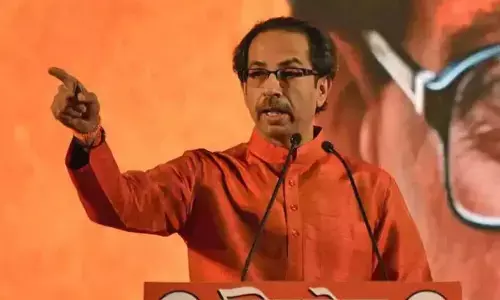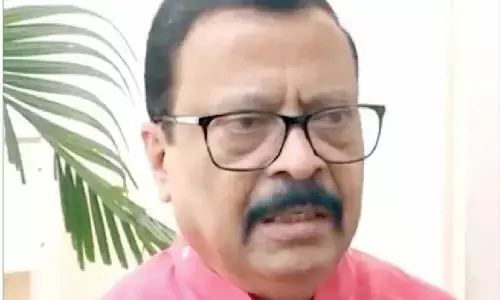India's stance paying rich dividends

India’s stance paying rich dividends
The ongoing Ukraine-Russia military conflict, the emerging pattern of developments in West Asia and the inscrutable economic 'Cold War' between the US-led West and the residual Communist empire now led by China, continue to shape the current geo-politics.
The ongoing Ukraine-Russia military conflict, the emerging pattern of developments in West Asia and the inscrutable economic 'Cold War' between the US-led West and the residual Communist empire now led by China, continue to shape the current geo-politics. It has to be acknowledged that India under Prime Minister Modi has handled international relations in this global setting in a manner that has best served the security and economic interests of the nation.
Prime Minister Modi who had the distinction of being the only world leader favoured by both Ukrainian President Zelensky and President Putin as a mediator, spoke to both early on to share India's stand with them. The US-led West is pumping in arms and other war equipment into Ukraine to help the Ukrainian army – by proxy – to resist the Russian military action but in the process this has become an unending conflict in which Russia is choosing its targets without having to unleash an all-out war.
A significant feature of this conflict is that the Indian formula for ending it still holds good. India's constructive policy stood its ground through the phase of sanctions imposed by the US and its allies on Russia and the multiple voting in UNSC on the Russian military action and in various summits like those of Quad, BRICS and G-7, many participants showed an understanding of India's stand. The US abstained from making any specific criticism of India's policy as both Prime Minister Modi and President Biden clearly understood that regardless of the Ukraine episode, Indo-US relations reflecting the natural friendship between the two largest democracies were destined to touch the deepest levels.
It also must have been seen by the democratic world that the Indo-Russia friendship was helping to keep Putin from totally drifting towards China – and this was good as much for the Western democracies as it was for India specifically. It is in the fitness of things that the US has brought back its focus on the aggressive designs of China by asserting its support to Taiwan and sending Speaker Nancy Pelosi to Taipei against President Xi Jinping's warnings. India's military resilience on the LAC on the one hand and total support to Quad on the other, are a part of India's strategy to thwart Chinese aggression on land and sea.
A consistent campaign of India against terrorism at all international forums has exposed not only Pakistan but also the Sino-Pak axis. India is positioning itself well as signs emerge of a new Cold War between the US and China.
China has been seeking the economic route to becoming a superpower – apart from building its military might – and the countering response of the US since the time of President Donald Trump has been to take on the former in the sphere of economy and trade. At the last Quad summit at Tokyo in May this year, President Biden significantly launched an initiative for building economic relationships called Indo-Pacific Economic Cooperation for Prosperity (IPEC). India actively supported the initiative, expressed its commitment to working with all members of IPEC and affirmed that this was in furtherance of India's aim of making the Indo-Pacific a free, open and inclusive region. China predictably denounced the move. India has handled US-China, US-Russia and China-Pakistan relationships in a manner that best served its own security and economic impact interests. This is a creditable strategic feat.
India's special friendship with Russia has proved to be of crucial help in fending off the hostile plans of Pakistan to involve radical Islamic forces in cross border terrorism against this country particularly after the success it achieved in reinstalling the Taliban Emirate in Kabul.
Developments in the Islamic world are currently impacting the geo-politics in a manner that requires India to keenly follow them and correctly interpret them for its own strategic interests. In the backdrop of the ongoing Ukraine-Russia military impasse, President Biden made a special visit to Israel and Saudi Arabia while the Russian President, Vladimir Putin, soon thereafter dashed to Iran to enlist the latter's support in the environ created by the US and European sanctions against Russia. The alignments within the Muslim world are dictated by the fundamental historical differences within Islam which must be clearly understood for the sake of our national security and international relations.
Islamic radicals consider the US-led West as their main enemy and oppose Muslim countries who were in the latter's camp. This is why Saudi Arabia and UAE feel threatened by radicals even though they tried to compete with them on the scale of fundamentalism. Pakistan unsurprisingly, has – from the very beginning of the US-led 'war on terror' launched in the wake of 9/11 – been on the right side of the radical leadership.
When the anti-Soviet armed campaign in Afghanistan led by the likes of HuM and LeT on the slogan of Jehad - with full backing of the US - succeeded, the Pakistani ISI planned to accelerate cross-border terrorism against India in Kashmir with the aim of replicating the success of the Afghan Jehad there with the help of militant outfits under its control such as HuM, LeT and Jaish-e-Mohammad. With its success in reinstalling the Taliban Emirate in Kabul, Pakistan is now escalating its covert offensive against India.
The Biden regime does see the threat from Islamic radicals and continues to pursue the strategy of eliminating the leadership of Al Qaeda – the US operation that took out Osama bin Laden at Abbotabad in Pakistan during President Obama's regime in 2011 has in a way been repeated in the covert drone attack killing Osama's successor, Ayman Al Zawahiri, at a safe house at Kabul on July 31 this year. Presuming that Islamic radicals might be bracketing India with the US, a spurt in the activity of the Taliban-Al Qaeda combine against this country cannot be ruled out. In any case India has to deal with the added threat of Islamic terror from the Pak-Afghan belt, largely on its own.
It was the insight into the inner goings on in the Muslim world that led India's National Security Advisor to call a meeting of his counterparts from Central Asian Republics (CARs), Russia and Iran at Delhi in the wake of the Taliban takeover of Afghanistan in August 2021. China and Pakistan though invited did not join and this was in line with the current alignments in the Muslim world. CARs are Muslim predominant countries but being in tune with Russia they are averse to Islamic radical influences emanating from Afghanistan. Iran is even more staunchly opposed to the latter. China's response to Taliban has been manoeuvred by Pakistan on the basis of a 'give and take' – also political opposition of radicals to the US suits China.
This dialogue of the NSAs at Delhi laid a solid foundation for our foreign policy on West Asia. Prime Minister Modi's personal outreach to the rulers of Saudi Arabia and the UAE – who were for reasons of strategic security drawn closer to the US and its staunch ally Israel, in view of the enlarged threats from radical Islamic forces and Iran – has proved to be an effective course for handling the Islamic world where Pakistan is now the acknowledged foster parent of radical outfits. An equation with Iran helps India economically and adds to the defence against Islamic radicals of the Sunni mainstream.
Finally, it can be said that the single most important feature of the current geo-politics is the danger that the democratic world as a whole faces from the axis of the Marxist dictatorship of China and the fundamentalist regime of Pakistan. The India-US friendship has to be geared to dealing with this twin threat.
(The writer is a former Director of Intelligence Bureau. The views expressed are personal)










